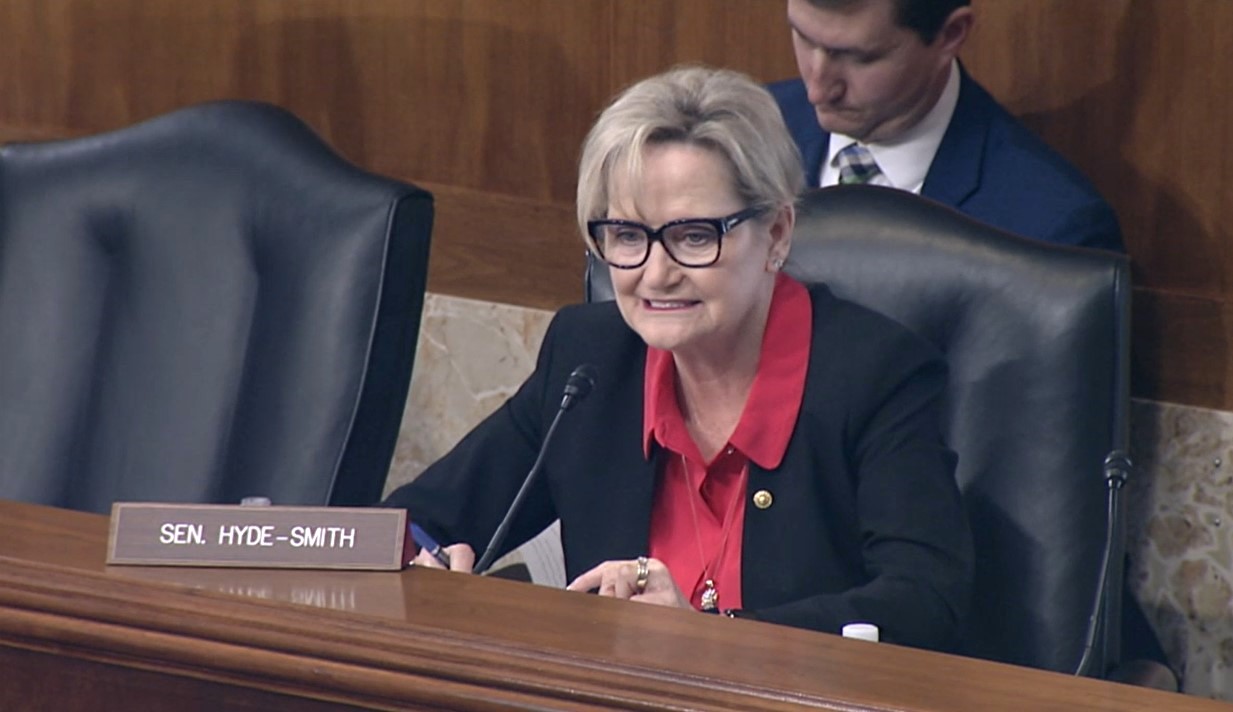HYDE-SMITH CHECKS INTERIOR DEPT. BUDGET COMMITMENT TO OFFSHORE ENERGY, UNIVERSITY PARTNERSHIPS
Miss. Senator Welcomes Interior Dept. Budget Focus on Gulf Energy Production, Critical Mineral Partnerships

VIDEO: Senator Hyde-Smith and Interior Secretary Burgum Review FY2026 Budget Request.
WASHINGTON, D.C. – U.S. Senator Cindy Hyde-Smith (R-Miss) on Wednesday praised the Trump administration’s commitment to offshore energy production and marine mineral exploration, both of which involve Mississippi and represent a stark departure from the previous administration.
Hyde-Smith serves on the Senate Energy and Natural Resources Committee that hosted Interior Secretary Doug Burgum at a hearing to review the U.S. Department of the Interior budget request for FY2026.
“Thank you, Mr. Secretary, for the great job that you’re doing. I so appreciate you revitalizing our nation’s offshore energy potential. The short-sightedness of the last administration to block the lease sales and lease areas could have been so much more detrimental,” Hyde-Smith said.
“Offshore oil and gas leasing in the Gulf of America is vital to ensure the entire nation’s energy dominance as we well know and allowing states like Mississippi to continue to receive GOMESA funds for coastal conservation and the restoration work, and for making funds available through programs like the American Battlefield Protection Program,” continued Hyde-Smith, who has a consistently supported gulf production in the face of Biden-era hostilities toward domestic oil and gas production.
Burgum, who is moving toward the first offshore lease sale in more than two years, explained the Trump administration’s overarching energy policy and its benefits to taxpayers.
“On a broader policy standpoint when we develop our nation’s resources, we have the revenue to go back to protect other things that people care deeply about,” Burgum said. “One of the things which I don’t think is widely understood is that the number one contributor to coastal restoration around the Gulf is revenue coming from the oil and gas industry as part of the revenue sharing from the royalties that the government receives from those that are developing.”
Hyde-Smith also questioned Burgum on continuing partnerships with institutions like the University of Mississippi to find ways to fulfill the nation’s need for critical minerals. Ole Miss is involved in collaborations and research projects related to the Bureau of Ocean Energy Management (BOEM), particularly in the area of marine minerals and resource evaluation.
“I’m pleased that the budget request highlights also the need for marine minerals and expanding critical mineral information and access in the Gulf of America. The University of Mississippi, Ole Miss, has provided support to these efforts over the years and is a willing partner in continuing to provide the technical and scientific support,” Hyde-Smith said. “What is the Department’s and the Bureau of Ocean Energy Management’s vision for critical mineral exploration and development in the Gulf of America, and will the department continue to rely on partnerships with research universities to achieve all of this?”
Burgum confirmed a commitment to continue collaborative partnerships with universities and the private sector, which he described as “one of the ways that we can stretch a federal dollar,” in the quest to discover new sources of critical minerals.
“I think that, you know, the partnerships are key,” Burgum said. “We’re in a battle where it’s been well understood for some time that China is controlling 85 percent of the refining of the rare earth minerals that we’re dependent on. This has to be a national priority of the highest order. We’ve got to get into the critical minerals game because we, like I said, we can’t build a fighter jet, a drone, a car, or a cell phone without them. Yet, somehow we found ourselves dependent on an adversary for that.”
In FY2024, the University of Mississippi received funds to conduct an exploratory mapping cruise in the Gulf brine pools as part of ongoing work by BOEM to assess the Outer Continental Shelf for critical mineral accumulation in multiple geological settings.
###
